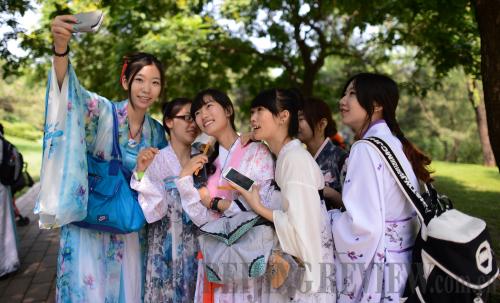|
 |
|
PRESERVING TRADITION: Women in traditional Chinese hanfu pose for a picture at the Yuan Dynasty City Wall Relics Park in Beijing on June 12 (WANG JIANHUA) |
While some young people in traditional Chinese costume hanfu read Lisao (The Lament) by ancient patriotic poet Qu Yuan (about 340-278 B.C.), others stuffed sachets with herbs like mugwort and vermilion, wove five-colored ropes and shot the "five poisonous insects" with arrows. These are only some of the ways traditional culture lovers in Beijing celebrated this year's Dragon Boat Festival in the Yuan Dynasty (1271-1368) City Wall Relics Park.
The Dragon Boat Festival, also named Duanwu Festival, which fell on June 12 this year, is celebrated each year on the fifth day of the fifth month of the Chinese lunar calendar.
On the streets, nine out of 10 people will say that the aforementioned festival commemorates Qu, and involves eating zongzi (a pyramid-shaped dumpling made of glutinous rice wrapped in reed leaves) as well as dragon boat racing.
Such events are closely related to Qu, a poet and statesman of the Chu Kingdom active during the Warring States Period (475-221 B.C.), who drowned himself in 278 B.C. after the king rejected his advice on governance. Due to corruption, his country was invaded and finally conquered by the Qin, the strongest kingdom of the seven states at the time.
When Qu's countrymen learnt about his death, they rushed to scatter rice across the Miluo River, where the poet succumbed by holding a big stone to his chest. In order to appease the fish so that they would not devour Qu's body, more rice was later thrown into the river in the form of zongzi. Meanwhile, many boats gathered trying to salvage his body, said to be the origin of today's racing.
However, some modern researchers suggest the story of Qu was only part of the reason for celebrating the festival, which was imposed to a pre-existing festival tradition.
As for its origins, theories differ, with three appearing to be more influential and widely accepted than others. That is why there are a number of folk traditions and myths connected to the observance of the festival.
The first theory suggests the festival originates from dragon totem worship among the Wuyue ethnic group (who live in southeast China) in ancient times, which gave rise to the popularity of dragon boat racing. The second theory says the festival is a day to remind people of driving away diseases, poisonous insects and evil spirits with the approach of the hot summer, which responds to the Duanwu customs of using mugwort, cattail, realgar wine, etc., which are still observed in many places across China, particularly in rural areas. The third theory, which is the most influential today, says the festival is attributed to Qu.
With most people only told of the poet, other customs that have long existed are no longer commonly observed, though some of them are practiced in some rural areas.
| 